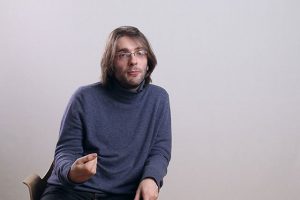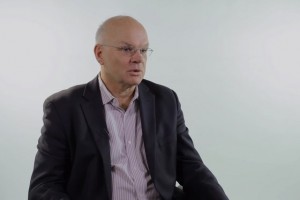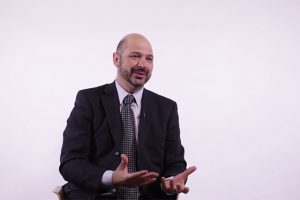Formal Logic
Philosopher Dennis Bonnay on metamathematics, set theory, and the Gödel's theorem
Post-truth was the Oxford dictionary word of the year for 2016. That’s why it is so prominent now. There are a lot of reasons why it should be chosen for that honor. That is because of the issues having to do with the way in which expert authority has been challenged and defied over the last 12 months, including things like the election of Donald Trump as president, Brexit in the UK and the rise of various populist movements – in all these cases against the way in which pollsters and experts have thought would happen.
Post-truth is getting at the distinction between talking about what is true and false and the condition, for the possibility of what is true and false. In philosophy we call the first issue a ‘first-order issue’ – we are talking about the kind of world where everybody shares common assumptions. In terms of them, we can say whether something is true or false. There are also second-order issues which have to do with the world where we haven’t agreed on the assumptions. In a sense, it is about establishing them – in terms of that you can talk about what is true and what is false.
The post-truth world is about the latter situation. Kant called it ‘transcendental conditions’ – he talked about it in terms of possibility of what is true and false. And this is what the post-truth condition brings out into the public display, it’s the idea that what we are talking about in politics and in the world in general is not simply about what is true and false – it is about the conditions under which one decides what is true and false. What is interesting about post-truth situation is that you are acknowledging this and having a fight over what are the conditions under what is true and false.
The whole point about fake news as a rhetorical token that Donald Trump uses is the fact that his opponents use it as well. Both sides accuse each other of providing fake news: Trump says it about the New York Times, the New York Times say this about Trump’s press spokesman Sean Spicer. This is about the contest not over what is true and false, but over the conditions under which what is true and false is decided. This is really the issue which is actually a part of the origin of Western philosophy, if you associate that with Plato.
Plato is the ultimate post-truth guy. In this respect, we have always been post-truth. Primarily, in “The Republic” – he has Dialogue, which is his main work on how to set up a just society. The interesting thing about how you set up a just society is how you end up having a divided view about what people should know. On the one hand, you have what Plato calls ‘the philosopher kings’. Those people are specially selected because of their talent. From an early age they are trained in the abstract subjects of mathematics, philosophy, music and astronomy. They are focused primarily on larger, more cosmic things, not on what other people think.
You might say that these people are the ones who know the truth, especially in terms of the truth for governance. Yet they are secluded. Plato does not believe that everyone should know this. He believes that if ordinary people actually knew about this kind of things, knowing that the world is open for all these possibilities would drive them crazy. According to Plato, the only reality most people can deal with is the one they directly experience. It becomes important that the kind of knowledge that the rest of the society should have is the one appropriate for their kind of lives.
This ends up meaning that from the standpoint of truth these people know a false way of the world that works and enables the ones who know the true way of the world to make a better world for all of them put together. That is the point of Plato’s republic – and that’s the kind of post-truth conception. The post-truth sensibility in Western philosophy ultimately comes from Plato’s “Republic”. It is often seen like a founding document of Western political philosophy but it is also a document in social epistemology that is in the way in which we understand how knowledge should be organized and distributed socially.
For Plato, the people who should be setting the conditions on the possibility of what is true and false are those who are educated in the most abstract forms of knowledge that command the most universal kind of coverage. What he meant here was that mathematics, what we would now call physics, astronomy, music are universal forms of understanding the world that do not depend on any particular material conditions.
On the other hand, the rest of humanity ought to know about the forms of knowledge that are relevant to the kinds of lives and experiences that they have. They should be reinforced in that form of knowledge. They should be told the sorts of things that will enable them to live as they had in the past. Plato saw that as a formula for a stable society. Strictly speaking, from the standpoint of philosopher kings, what the rest of the population knew was false, in the sense that people were being led to believe that the only things that there were in the world where the ones that were directly tied to their material conditions. There was nothing to go beyond, to aspire and to think about for them.
One of the first things Plato did in establishing this original post-truth order where only a certain group of people controls what is true and false and all the rest just believes it is that the strong fact-fiction distinction. What makes post-truth work is the idea that if you have people who believe that the world needs to be operate in a certain way, regardless of where they are in it, you have a strong fact-fiction distinction. When I think about alternative ways in which the world could be, I think that it is just fiction. Plato was enforcing this kind of idea. It is very much with us today – and it is a post-truth idea.
The way you can see how post-truth this idea is, that it is very insistent on fact-fiction distinction, is the kind of people who Plato considered his biggest enemies in his own day. They were the playwrights – the people who did drama. You have to think of ancient Athens as the place where the plays were performed largely in the same kinds of public spaces in which politics was normally conducted. From a physical standpoint, there was no strong distinction between fact and fiction. That had to be manufactured in some kind of way. What Plato was objecting to in the playwrights was the fact that here we have people who are creating alternative reality which looks different from the reality they were normally taught to be true. It went outside of what was the accepted kind of understanding of what is true and what is false.
Plato thought such people were dangerous – especially if the plays were good and realistic whereby people could think that what is going on the stage could well go outside it. The fact-fiction reality gets blurred. At that point Plato thought that chaos would ensue, that the social disturbances would occur. Western history is full of this kind of concerns – this is not unique to Plato. The interesting thing here is that it demonstrates that both Plato and the playwrights understood each other perfectly. They both realized they were acting in a post-truth world: what they are doing is competing over the conditions under which true and false are decided. Neither side is taking true and false for granted.
In this respect, you might see things the playwright is doing as a kind of alternative government, alternative way of organizing society. One of the things that Plato’s student Aristotle did and that contained this kind of sensibility was in his own view about drama. Aristotle says a thing about it which is very pertinent to the history of aesthetics: if you have a well-formed play, it reaches a natural closure, a conclusion. There is what Aristotle calls the ‘catharsis’, where all the emotions and issues that the audience is building up alongside of the actors disappears and people go back to normal. They leave the theater being just the way they were when they entered it.

Philosopher Dennis Bonnay on metamathematics, set theory, and the Gödel's theorem

Philosopher Derk Pereboom on compatibilism, causal determination, and Spinoza

Communication Scholar Grant Kien on Heidegger, Google glass, and autoethnography